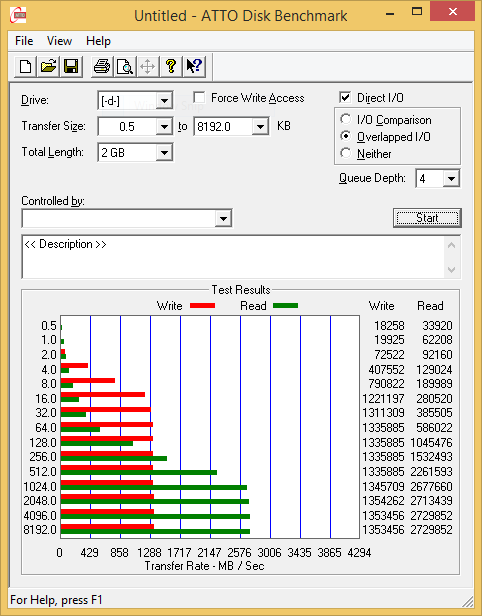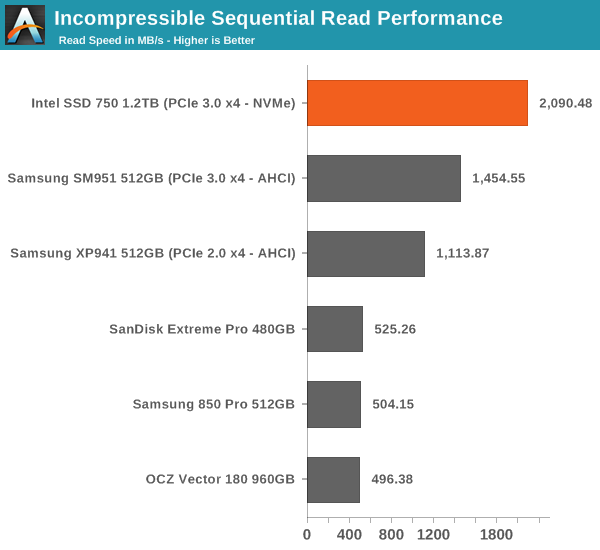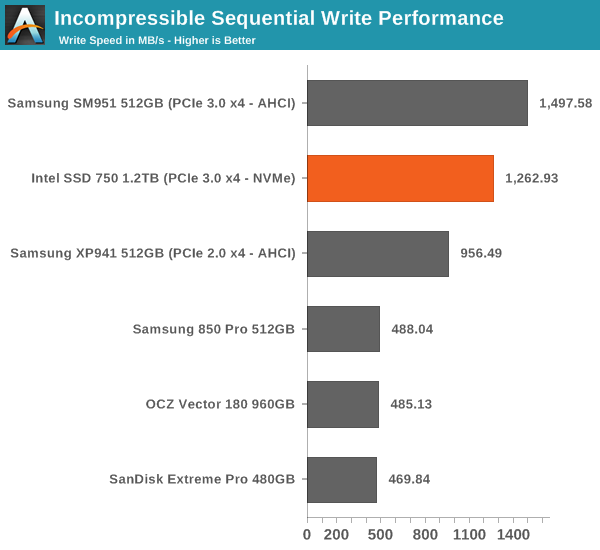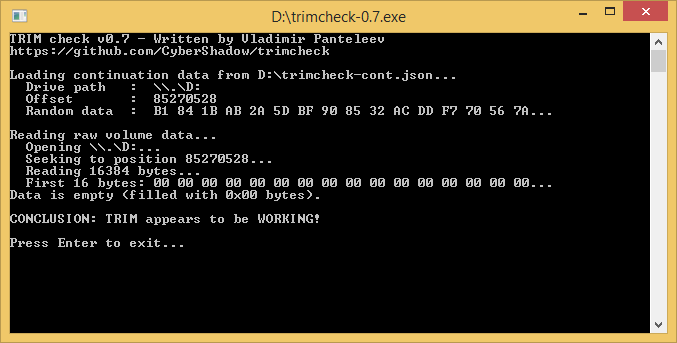Intel SSD 750 PCIe SSD Review: NVMe for the Client
by Kristian Vättö on April 2, 2015 12:00 PM ESTATTO - Transfer Size vs Performance
I'm keeping our ATTO test around because it's a tool that can easily be run by anyone and it provides a quick look into performance scaling across multiple transfer sizes. I'm providing the results in a slightly different format because the line graphs didn't work well with multiple drives and creating the graphs was rather painful since the results had to be manually inserted cell be cell as ATTO doesn't provide a 'save as CSV' functionality.
 |
|||||||||
AS-SSD Incompressible Sequential Performance
I'm also keeping AS-SSD around as it's freeware like ATTO and can be used by our readers to confirm that their drives operate properly. AS-SSD uses incompressible data for all of its transfers, so it's also a valuable tool when testing SandForce based drives that perform worse with incompressible data.


TRIM Validation
The move from Windows 7 to 8.1 introduced some problems with the methodology we have previously used to test TRIM functionality, so I had to come up with a new way to test. I tested a couple of different methods, but ultimately I decided to go with the easiest one that can actually be used by anyone. The software is simply called trimcheck and it was made by a developer that goes by the name CyberShadow in GitHub.
Trimcheck tests TRIM by creating a small, unique file and then deleting it. Next the program will check whether the data is still accessible by reading the raw LBA locations. If the data that is returned by the drive is all zeros, it has received the TRIM command and TRIM is functional.
And as expected TRIM appears to be working.











132 Comments
View All Comments
perula - Thursday, April 9, 2015 - link
[For Sell] Counterfeit Dollar(perula0@gmail.com)Euro,POUNDS,PASSPORTS,ID,Visa Stamp.Email/ perula0@gmail.com/
Text;+1(201) 588-4406
Greetings to everyone on the forum,
we supply perfectly reproduced fake money with holograms and all security features available.
Indistinguishable to the eye and to touch.
also provide real valid and fake passports for any country
delivery is discreet
We offer free shipping for samples which is 1000 worth fake as MOQ
oddbjorn - Tuesday, April 14, 2015 - link
I just recieved my 750 yesterday and soon found myself slightly bummed out by the lacking NVMe BIOS-support in my ASUS P8Z77-V motherboard. I managed to get the drive working (albeit non-bootable) by placing it in the black PCIe 2.0 slot of the mainboard, but this is hardly a long term solution. I posted a question to the https://pcdiy.asus.com/ website regarding possible future support for these motherboards and this morning they had publised a poll to check the interest for BIOS/UEFI-support for NVMe's. Please vote here if you (like me) would like to see this implemented! https://pcdiy.asus.com/2015/04/asus-nvme-support-p...Elchi - Wednesday, April 15, 2015 - link
If you are a happy owner of an older ASUS MB (z77, x79, z87) please vote for NVme support !http://pcdiy.asus.com/2015/04/asus-nvme-support-po...
iliketoprogrammeoo99 - Monday, April 20, 2015 - link
hey, this drive is now on preorder at amazon!http://amzn.to/1DDKwoI
only $449 on amazon.
vventurelli74 - Monday, May 4, 2015 - link
Lets say I had an Intel 5520 Chipset based computer that has multiple PCIe 2.0 Slots. I would be able to get almost the maximum read performance (Since PCIe 2.0 is 500MB/s per 1X, 4X = 2000MB/s, which is exciting on an older computer. I am curious as to if this would be a bootable solution on my desktop though. With 12 Cores and 24 Threads, this computer is far from under-powered, and it would be nice to breath life into this machine, but the BIOS would have no NVMe support that I can think of. I know it has Intel SSD support, but this is from a different era. I wish someone could confirm that this either will, or will not be bootable on non-MVMe mobo's. I am getting conflicting answers.vventurelli74 - Monday, May 4, 2015 - link
Nevermind, finally found the requirements that this drive will not be bootable on on NVMe machines, whats more is even using it as a 'secondary' drive requires UEFI apparently. My computer wouldn't be able to use this card at all? That would suck.xyvyx2 - Friday, May 8, 2015 - link
Great review!Kristian, any chance you have two of these drives in the same machine & you could test RAID0 performance? I'm running into some slow read performance when using two Samsung PCIe drives in a Dell server w/ a RAID1 or RAID0 config. It's not like regular bottlenecking where you hit a performance cap, but where transfer rate drops down to ~ 1/5th the speed at a lower xfer rate.
I thought this was just a Storage Spaces problem, but the same holds true w/ regular windows software raid. I got up to about 4,200 MB/sec, then it tanked. I then ran two simultaneous ATTO tests on two of the drives and they both behaved normally & peaked at 2,700 MB/sec... so I don't think I'm hitting a PCIe bus limitation... I think it's all software.
I posted more detail on Technet here:
https://social.technet.microsoft.com/Forums/en-US/...
shadowfang - Saturday, September 26, 2015 - link
How does the pcie card perform on a system without nvme?